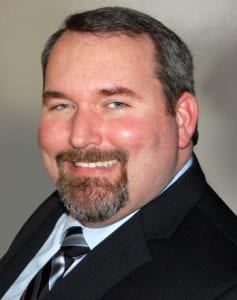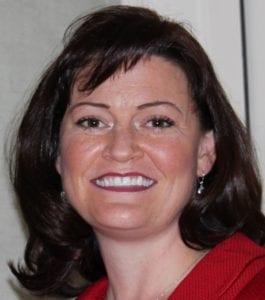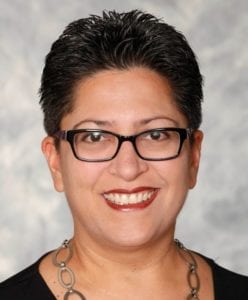 From Coconino to Cochise counties, seven Flinn-Brown Fellows are working through Arizona’s community colleges—three as elected district governing-board members and four through their professional careers—to ensure quality education options and services for Arizonans. The Fellows’ roles and expertise in post-secondary education are critical to their aims for state-level service.
From Coconino to Cochise counties, seven Flinn-Brown Fellows are working through Arizona’s community colleges—three as elected district governing-board members and four through their professional careers—to ensure quality education options and services for Arizonans. The Fellows’ roles and expertise in post-secondary education are critical to their aims for state-level service.
The state’s 19 public community colleges and three tribal colleges serve hundreds of thousands of Arizonans, from Kingman to Thatcher, offering degree and certificate programs, workforce training, and special-interest classes. AZTransfer, a partnership between the community colleges and state universities, ensures that students move readily from institution to institution.
Recent state-level discussion of educational attainment goals have coalesced around a target of 60 percent of Arizonans achieving some type of postsecondary degree or high-quality certificate by 2030—a goal that would be impossible to consider without the work of the community colleges.
This article, the second of two on Flinn-Brown Fellows in community-college roles, profiles the four Fellows working in staff and faculty capacities at the Maricopa Community Colleges.
Eddie Genna, associate vice chancellor in the division of public affairs, Jennifer Lane, English faculty at Glendale Community College, Kevin Velasquez, fiscal technician for South Mountain Community College and president of the United Tribal Employee Council, and Deanna Villanueva-Saucedo, director of community outreach in public affairs, together have decades of experience in the Maricopa Community Colleges that collectively serve about 240,000 students at 10 individually accredited colleges, two skill centers, and satellite campuses.
Eddie Genna
 Genna has been in his current role in the Maricopa Community Colleges public-affairs office since June 2015, but is also a longtime faculty member in philosophy and political science at Phoenix College. He teaches in the Certificate in Community Development and Engagement program, where students learn to affect public policy in their own communities.
Genna has been in his current role in the Maricopa Community Colleges public-affairs office since June 2015, but is also a longtime faculty member in philosophy and political science at Phoenix College. He teaches in the Certificate in Community Development and Engagement program, where students learn to affect public policy in their own communities.
Genna, who after law school worked as a Berkeley Law Foundation Fellow at Community Legal Services in Phoenix, is a past president of the Maricopa Community Colleges Faculty Association. He sits on the board of Central Arizona Shelter Services and the AGUILA Youth Leadership Institute, which reaches out to Latino youth in junior high and high school to connect them to college opportunities and scholarships.
The public-affairs office oversees lobbying on behalf of the colleges. Genna says most of his office’s government-relations work is on the state level, although the office also has relationships with municipal governments where the colleges are located. His work now is chiefly to help the colleges, one of the nation’s largest providers of higher education, be top of mind in the community, create partnerships for solutions to workforce development and educational problems, and meet a civic need.
Genna notes that there are many aspects of the colleges that people may not realize.
“We are a hidden gem in many ways and have many facets,” he says.
Jennifer Lane
 Lane has been a faculty member at Glendale Community College since 1997, teaching in the English and business departments. She primarily teaches writing, and engages students in critical thinking about civic responsibility and how one’s individual participation can positively impact his or her community. Lane also encourages students to participate in the Veterans History Project, a program of the Library of Congress that captures stories about veterans’ service. She has also been a district research Fellow with a special project on various civic-engagement strategies for students.
Lane has been a faculty member at Glendale Community College since 1997, teaching in the English and business departments. She primarily teaches writing, and engages students in critical thinking about civic responsibility and how one’s individual participation can positively impact his or her community. Lane also encourages students to participate in the Veterans History Project, a program of the Library of Congress that captures stories about veterans’ service. She has also been a district research Fellow with a special project on various civic-engagement strategies for students.
“I like the opportunity that community colleges offer for students to engage in their community at the same time as learning,” Lane says. “I love teaching at the community college because I believe in the community component of what we do.”
Lane is also a member of Arizona’s Governor’s Commission for Service and Volunteerism and is on the national board of directors of National Charity League, Inc., a mother-daughter organization for seventh- through 12th-graders.
Kevin Velasquez
 Velasquez started his career as a student worker while attending Mesa Community College. After graduation, he moved to business services, working first in the district headquarters in Tempe. Earlier this year he moved to South Mountain Community College for his role as fiscal technician.
Velasquez started his career as a student worker while attending Mesa Community College. After graduation, he moved to business services, working first in the district headquarters in Tempe. Earlier this year he moved to South Mountain Community College for his role as fiscal technician.
For the past eight years, Velasquez has served as president of the United Tribal Employee Council, an association of American Indian employees who work for Maricopa Community Colleges. The organization has nearly 200 employee members. The group’s signature event is the American Indian Convocation Ceremony held each May.
“The event is a cultural ceremony with American Indian themes that is a celebration of the academic achievements of our students who graduate or receive a certificate from our schools,” says Velasquez, who attended high school near Window Rock on the Navajo Nation.
Deanna Villanueva-Saucedo
Villanueva-Saucedo is the director of community outreach in the Colleges’ public-affairs office. She manages the Student Public Policy Forum, a yearlong program where students from all 10 colleges study public policy, leadership, and have the opportunity to interact with elected officials. She also works with five community-advisory committees that meet quarterly with district Chancellor Maria Harper-Marinick, and is studying how the institution serves its Hispanic population—through recruitment, enrollment, curriculum and more—in response to a federal designation as a Hispanic-serving institution.

Flinn-Brown
“If we are truly an organization serving our community, it goes beyond the buildings located in our cities,” Villanueva-Saucedo says. “We need to be embedded in community life, in civic
engagement and participation, and reaching out to students to get them involved.”
In the community, Villanueva-Saucedo is the board chair for the Mesa Association for Hispanic Citizens, a Latino-based advocacy group, and A New Leaf, a social-services nonprofit organization, and a member of the board of East Valley Partnership.
The four community college professionals are part of the 260-member Flinn-Brown Network, and each has used the knowledge and connections gained through Flinn-Brown to benefit the colleges and enhance their personal leadership and effectiveness. The Flinn-Brown Civic Leadership Academy was launched in 2010 and is sponsored by the Phoenix-based Flinn Foundation with support from the Thomas R. Brown Foundations of Tucson.
“Flinn-Brown opened my eyes to the insights of the inner workings of government, and you typically either learn that on the job as a government-relations employee or as an elected or government official,” Genna says. “Getting those insights from Flinn-Brown got me up to speed.”
Villanueva-Saucedo says Flinn-Brown gave her a more intelligent perspective about policy that she can share from her community-outreach position. She also touted the connections made as part of the network.
“To this day I’m in regular communication with many Fellows,” Villanueva-Saucedo says.
Velasquez says the coaching offered to Fellows after the seminar series has proven valuable as he has pursued board and commission appointments and started to make a pitch for greater visibility for American Indian students in district leadership.
For Lane, Flinn-Brown increased her awareness and knowledge of broader issues including those impacting rural areas.
“Participation in Flinn-Brown gave me a depth of understanding across a number of different areas, which definitely has helped me encourage students to follow their passions in a diverse cross-section of topics as opposed to just resting in my areas of comfort,” Lane says.
Lane says the Flinn-Brown Network helped her learn how volunteers and community members could address statewide issues, which has benefited her service on the Governor’s Commission for Service and Volunteerism.
“Flinn-Brown is a continuing connection and continuing source of support and intellectual development,” Lane says.